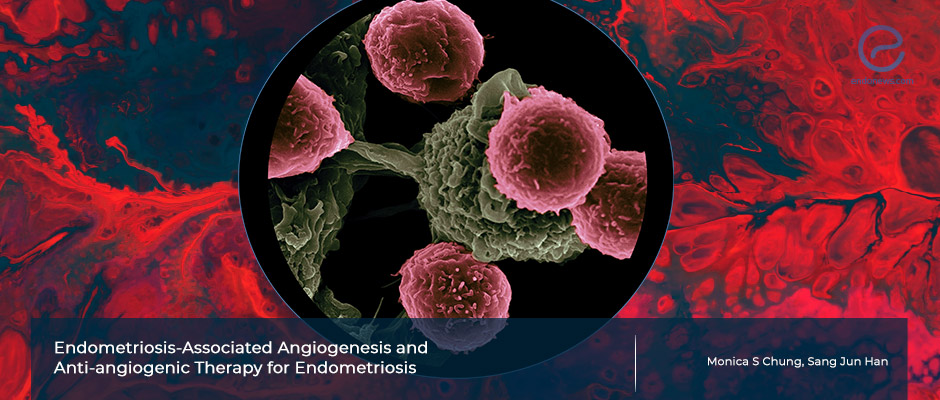Does inhibiting the formation of the new blood vessels aid in endometriosis treatment?
Jun 30, 2022
Anti-angiogenic treatment modalities have been investigated as a potential non-hormonal therapy method in endometriosis
Key Points
Highlight
- Anti-angiogenic treatment modalities emerge as an alternative to non-surgical hormonal treatment of endometriosis and promise good results.
Importance
- The formation of new blood vessels play part in endometriosis pathogenesis through various pathways, and the inhibition of angiogenesis has been used as a treatment method in different cancers.
What’s done here
- This is a mini-review study of the current knowledge on endometriosis-associated angiogenesis and the treatment methods that aim to inhibit the angiogenic properties.
- The factors and mechanisms that play a role in angiogenesis pathogenesis and different therapy methods were discussed in detail.
Key results
- Cytokines that secrete angiogenic molecules such as IL-1b, IL-6, IL-17A, and Vascular Endothelial Growth Factor (VEGF) play a role in angiogenesis.
- Increased VEGF levels were found in the peritoneal fluid in women with endometriosis and in the endometriotic lesions.
- Hypoxia-inducible factor 1a works in conjunction with VEGF and was found to be increased in ovarian endometriomas.
- Estrogen receptors and peptide hormones are also known to play roles in the angiogenesis of endometriotic lesions.
- Various angiogenic blockers such as VEGF blockers and inhibitors, macrophage migration inhibitory factor, retinoic acid, statins, cabergoline, and ERmblockers have been examined as anti-angiogenic agents in the treatment of endometriosis.
Lay Summary
Current treatment modalities for endometriosis include a hormonal alteration which has many side effects and surgical removal which has a high postoperative recurrence rate. Alternative non-hormonal treatment methods have been investigated and anti-angiogenic therapy is one of them.
Dr.s Chung and Han from Texas, United States have conducted a mini-review that aimed to explore the present knowledge about the effects of angiogenesis in endometriosis and the anti-angiogenic treatment modalities. The study was published in the journal "Frontiers in Global Women’s Health".
Angiogenesis is the formation of new blood vessels from the pre-existing ones to provide blood supply to the tissue. It is a highly regulated physiological mechanism in normal reproduction, however, its dysregulation contributes to many diseases. It also plays an important role in endometriosis pathogenesis, because endometriotic implants need blood to survive. There are various factors that help endometriosis-associated angiogenesis in the progression of endometriotic lesions. These include some cytokines that secrete angiogenic molecules such as IL-1b, IL-6, IL-17A, and Vascular Endothelial Growth Factor (VEGF). VEGF is normally increased during the menstrual period, however, increased VEGF levels were found in the peritoneal fluid in women with endometriosis and in the endometriotic lesions.
Another molecule that works in conjunction with VEGF is Hypoxia-inducible factor 1a (HIF-1a) which was found at higher levels in ovarian endometriomas. Estrogen is known to be a pro-angiogenic hormone and 17b estradiol is known to upregulate VEGF expression. Estrogen receptors play roles in many molecular pathways aiding endometriosis-associated angiogenesis. Different peptide hormones are also known to take part. The authors state that the role of thyroid hormone is also being investigated as it is thought to contribute to the disease.
Anti-angiogenic therapies that are being examined include various angiogenic blockers such as VEGF blockers and inhibitors, macrophage migration inhibitory factor, retinoic acid, statins, cabergoline, and ERbreceptor blockers. The authors also touch on the topic that explains the different mechanisms of resistance to anti-angiogenic therapies.
In conclusion, it is stated that anti-angiogenic therapy seems to be helpful in the non-hormonal treatment of women with endometriosis and promises good results and smaller anti-angiogenic molecules derived from natural products such as polyphenols, polysaccharides, and alkaloids have more advantages than their synthetic counterparts. Further studies are needed to develop new anti-angiogenic drugs.
Research Source: https://pubmed.ncbi.nlm.nih.gov/35449709/
endometriosis angiogenesis anti-angiogenic therapy VEGF

